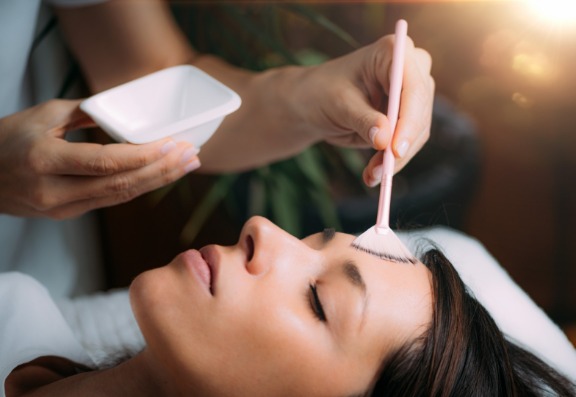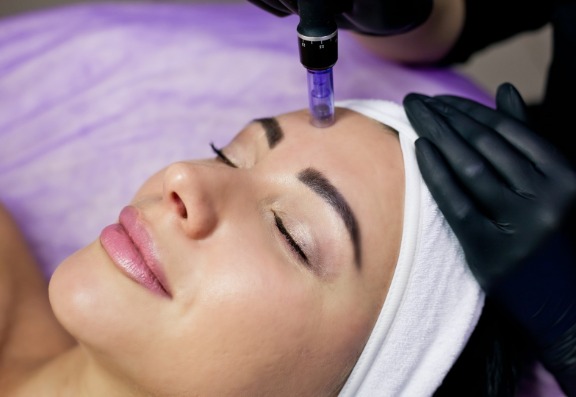So, what exactly is hyperpigmentation?
Essentially, it’s an area of darkened skin. It can appear in small, isolated patches – like age spots – or cover larger areas. It can affect any part of the body, but common trouble areas are the face, neck and hands.
Without getting too technical, hyperpigmentation is the result of excess production of melanin in the skin, and this can be caused by a number of different factors – such as sun damage, scarring from acne, pregnancy and even just the effects of ageing.
Hyperpigmentation is incredibly common, and it’s likely you’ll experience it at some point in your life if you haven’t already. That being said, there are also a number of treatments you can consider to help minimise its effects.
Chemical Peels
Chemical peels are a great way of treating damage to the upper layer of the skin (the epidermis). By removing the dead and damaged skin cells of this layer, the peel encourages new, unblemished skin to grow in its place.
I use the Glow Peel by AlumierMD, which is a medium-strength peel – meaning little to no downtime. You’ll be able to return to your normal routine straight away after the treatment – just be sure to protect your new, sensitive skin from the sun!


Microneedling
One of my favourite treatments, micro-needling really can help improve a variety of skin conditions – and hyperpigmentation is one of them! This treatment stimulates the skin to heal itself, shedding the damaged, pigmented layer and boosting blood flow, collagen and elastin production in the skin.
It also increases the rate of absorption for topical skincare, which is another important part of treating hyperpigmentation. Clinic treatments are only half the battle – you need to protect your skin against hyperpigmentation in your daily skincare routine by including some important topical treatments and active ingredients.
Tyrosinase Inhibitors
The enzyme tyrosinase is responsible for the amount of melanin produced in your skin. Tyrosinase inhibitors suppress how much melanin is produced, helping to put a stop to hyperpigmentation. Using these active ingredients in your skincare is a preventative measure against future occurrences of pigmentation.
Types of tyrosinase inhibitors to look out for in skincare products include azelaic acid, L-ascorbic acid, arbutin, hydroquinone and retinoids.
Remember to always use medical-grade skincare, as high street alternatives often do not have the required percentage of active ingredients to see results. Some medical-grade skincare solutions are only available by prescription, so it’s important to consult a properly trained expert about the best options for you.
Retinoids
Speaking of retinoids, I can’t recommend this wonder ingredient enough, and retinol is something I’ve frequently recommended in a well-rounded daily skincare routine. Like microneedling, retinol can improve a variety of skin complaints, and in the case of hyperpigmentation, helps to prevent the over-production of melanin, as well as giving you a clearer, smoother complexion.
It’s important to build up your resistance to retinol, and apply it in the evenings only, as your skin is extra sensitive after use.
Wear Sunscreen
As I always say, never underestimate the importance of sunscreen! You should be applying a broad-spectrum, physical sunscreen every day – whether it’s the height of summer or the middle of winter. UV rays from the sun damage your skin year-round, and as sun damage can cause and worsen pigmentation, it’s important to ensure you’re protected.
However, it’s doubly important to use sunscreen after applying tyrosinase inhibitors, like retinol, as they leave your skin even more vulnerable to the sun’s UV rays.

Of course, on top of all this, it’s vital to ensure you keep up your regular routine – exfoliating with gentle cleaners and using hydrating moisturisers. This will help to make your skin more resistant to common unwanted conditions and keep it looking smooth, youthful and bright.
Looking for treatment for hyperpigmentation in Kings Hill, West Malling and the surrounding areas? Get in touch for a consultation today!
If you want to read more, the experts at Consulting Room really know what they're talking about and have put together some scarring, acne, chemical peels, AlumierMD, micro-needling, hyperpigmentation, medical skin cremes and sunscreen FAQs just for you.
If you have more questions, you can use the scarring, acne, chemical peels, AlumierMD, micro-needling, hyperpigmentation, medical skin cremes and sunscreen questions feature to talk to our panel of trained medical experts.
If you're keen to get started with any of these treatments right away then you're in luck - those clever folks also have a list of trusted, accredited scarring, acne, chemical peels, AlumierMD, micro-needling, hyperpigmentation, medical skin cremes and sunscreen clinics in your area.
Many thanks to the author of this blog Dr Raquel Amado who is from Dr Raquel Skin and Medical Cosmetics.
Throughout her career, Dr Raquel has understood that most people are looking for a reliable, honest relationship with their practitioner, which is why she takes the time to understand how her patients feel.
Dr Raquel is known for her friendly and caring manner, being discreet, and putting her patients at ease.
She is committed to the provision of safe, high-quality patient care in order to achieve the best outcomes for patients, and make them feel confident in their own skin.
Call Dr Raquel Skin and Medical Cosmetics on 01732 525 875 or visit www.skinandmedicalcosmetics.co.uk.

A survey reveals that most people trust dermatologists far more than social media influencers, yet many continue to spend money on treatments that don’t work.
Croma’s latest range brings professional in-clinic results into your everyday routine. Clean, vegan, and packed with powerhouse ingredients, these products are designed to hydrate, brighten, protect, and fight early signs of ageing.
We ask an expert skin doctor: ‘What are the benefits of LED therapy, and is it worth the investment?’
Hey, wait!
Before you go.....
Let's stay in touch, pop your details here and we'll send our editor's hand-picked updates on your fave subjects.